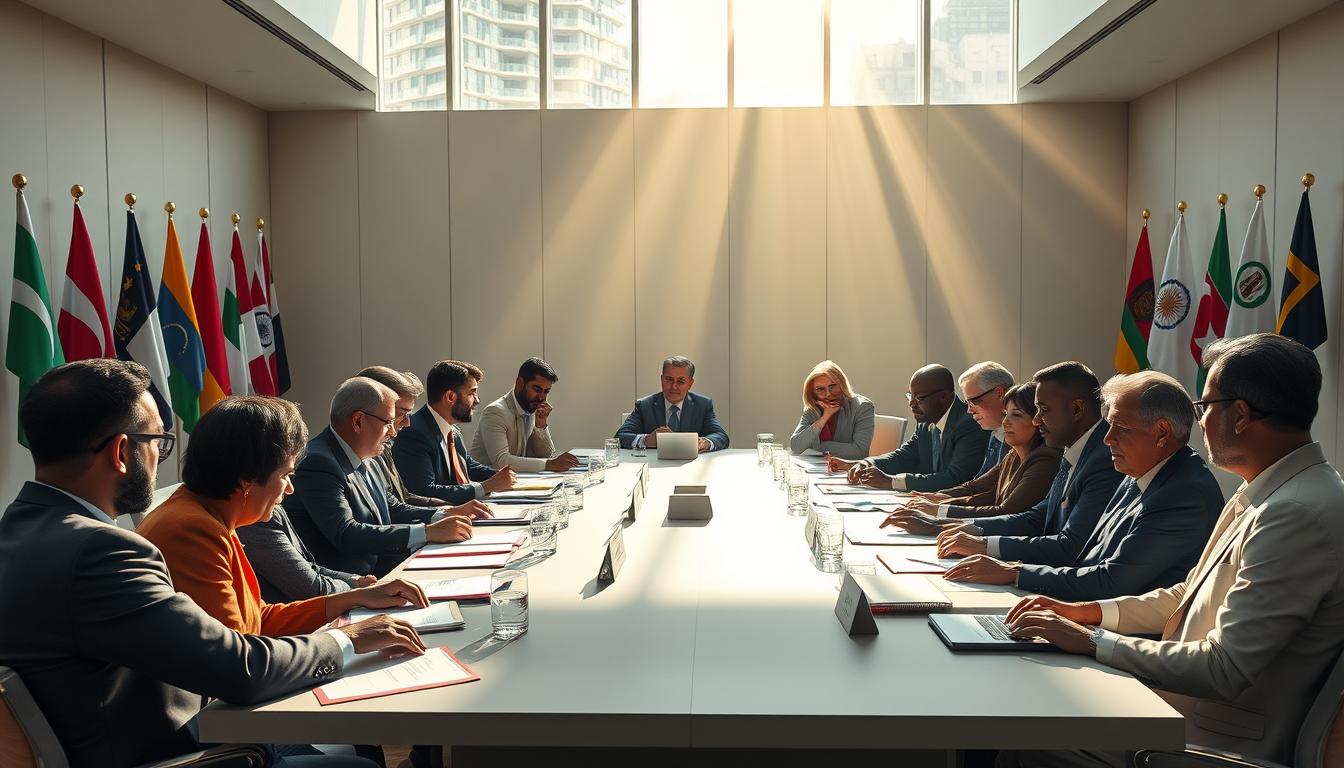In 2023, over half the world’s population lived in the Global South. But they had much less global diplomatic influence. This fact shows we need change in world relations. Emerging middle powers are stepping up. They’re not just asking for a place at the diplomacy table. They’re changing the rules to fit their needs and views. There’s a strong push for a new world order in 2024. These countries are challenging old powerhouses and making their mark worldwide.
Middle powers from the Global South are taking the lead in diplomacy. They’re using soft power, building alliances, and facing the challenges of superpower control together. This story will show you how these nations are carving a new path in diplomacy.
Key Takeaways
- The Global South now represents over half of the world’s population, increasing its call for influence.
- Middle powers are reshaping international relations by challenging the established norms of diplomacy.
- A shift towards a multipolar world order is expected as these nations assert their voices.
- Soft power and regional alliances are becoming crucial components of their diplomatic strategies.
- Collective responses to superpower dynamics are shaping the future of global diplomacy.
The Rise of Middle Powers in the Global South
The rise of middle powers in the Global South is now a reality. Nations like India, Brazil, and South Africa are showing their power. They use their economic, social, and cultural strengths to make an impact globally. This change highlights how growing nations are changing the world’s leadership.
These countries are tackling big issues like climate change, trade, and peacekeeping. Their efforts improve their own status and help balance global power. By forming alliances, middle powers push for teamwork that goes beyond old political lines. This makes world relations more welcoming for everyone.
Understanding Middle Power Diplomacy
Middle powers have a special spot in international relations. They are not just known for their economic or military strength. Instead, their diplomatic roles make them stand out. They help shape global affairs by working together and building consensus. Middle powers are seen as key players in discussions and helping solve conflicts.
Defining Middle Powers and Their Role in International Relations
Middle powers like working together with other countries to tackle big world problems. Scholars see these countries as good at connecting major superpowers. They help keep peace and stability when the world is under tension. By taking part in global governance, they look out for their own interests and help keep everyone safe.
The Historical Context of Middle Power Diplomacy
The way middle powers act has changed over time. During the Cold War, countries like Canada and Australia helped mediate between the US and the Soviet Union. Nowadays, emerging middle powers from the Global South are getting bolder. They want to change how big international groups like the United Nations operate. This shows how flexible and important middle power diplomacy is.
The Emphasis on Soft Power in Diplomacy
In diplomacy, balancing soft and hard power is key. Nations use soft power to enhance their global influence. This power comes from cultural appeal, shared values, and diplomacy, not force. Joseph Nye introduced this idea, highlighting the role of non-forceful actions in world affairs.
Soft Power vs. Hard Power: A Comparative Analysis
Hard power relies on military or economic force but has limits. Our interconnected world shows hard power often fails to build lasting bonds. In contrast, soft power fosters trust and respect, creating strong partnerships.
| Aspect | Soft Power | Hard Power |
|---|---|---|
| Definition | Influence through cultural appeal and diplomatic relations | Influence through military and economic coercion |
| Approach | Engagement and collaboration | Force and intimidation |
| Long-term Effectiveness | High, fosters enduring partnerships | Limited, often leads to resentment |
| Examples | Cultural exchanges, foreign aid | Military interventions, sanctions |
Countries now see the value of mixing soft and hard power. Nations, especially in the Global South, use soft power in many ways. They focus on international cooperation, cultural diplomacy, and aid. This strategy helps them deal with global diplomacy’s challenges effectively.
Global South Alliances: A Shift in Power Dynamics
New alliances in the Global South signify a big change in global relations. These countries work together to tackle issues like economic growth and climate change. Their cooperation challenges the traditional power of leading nations.
By partnering, these countries strengthen their say on the global stage. They make their voices heard better by sticking together. This not only boosts their negotiation power but also spreads common goals among developing countries.
| Alliance | Members | Focus Areas |
|---|---|---|
| BRICS | Brazil, Russia, India, China, South Africa | Trade, Investment, Sustainable Development |
| ASEAN | 10 Southeast Asian Nations | Economic Growth, Stability, Security |
| African Union | 55 African Countries | Development, Peace, Human Rights |
| G77 | 134 Developing Countries | Economic Equity, Policy Advocacy |
These alliances are shifting global power, highlighting the importance of working together. They reshape how nations interact and impact international decisions.
The Role of Emerging Economies in Geopolitics
Emerging economies are changing the global political landscape. Countries like Indonesia and Turkey are showing how middle powers can make a big impact. They use their special positions to deal with complicated world issues, push for their goals, and work towards regional unity.
Indonesia and Turkey: Case Studies in Middle Power Influence
Indonesia is key in the Indo-Pacific area because of its spot on the map and its part in ASEAN. It wants to bring stability and growth to Southeast Asia with its foreign policy. At the same time, Turkey’s approach in diplomacy makes it important between the West and the Middle East. It manages its old ties with NATO while keeping up relations with its neighbors.
South Africa’s Unique Position in Global Diplomacy
South Africa is special in the Global South because of its past and its role in politics. Being in BRICS, it speaks up for developing countries on big topics. Its foreign policy focuses on leading the region and uniting Africa. This shows how middle powers can shape politics both nearby and worldwide.
| Country | Key Aspects | Influence in Geopolitics |
|---|---|---|
| Indonesia | Strategic location, ASEAN involvement | Promotes stability and economic growth |
| Turkey | NATO membership, historical ties | Balances Western interests and regional dynamics |
| South Africa | BRICS member, focus on pan-Africanism | Acts as a leader for developing nations |
Rewriting Diplomatic Rules Through Regional Cooperation
Regional cooperation among nations in the Global South is changing traditional diplomacy. These countries work together, creating alliances to tackle shared problems. This makes their voice stronger globally. The African Union is a key example of this, promoting peace and development in Africa.
Working together lets countries stand stronger on the global stage. As they unite, the rules of diplomacy are changing. Through trade agreements, they can boost their economies and address common issues. This includes everything from trade problems to environmental concerns.
But the benefits aren’t just economic. By teaming up, countries use their combined resources and knowledge for more influence. This change doesn’t just shift roles for single nations. It also leads to a fairer balance of power worldwide.
| Regional Cooperation Initiative | Primary Objectives | Key Outcomes |
|---|---|---|
| African Union | Promote peace, security, and economic development | Conflict resolution, trade facilitation |
| Association of Southeast Asian Nations (ASEAN) | Enhance regional stability and economic growth | Increased trade partnerships, cultural exchange |
| Community of Latin American and Caribbean States (CELAC) | Strengthen regional collaboration on social issues | Social policy alignment, collective bargaining |

Today, diplomacy is evolving because of regional teamwork. This cooperation is a force for change. By forming diplomatic alliances, countries can take on global challenges together. This is done through understanding and working together.
Global South Strikes Back: A Collective Response to Superpowers
A revitalized non-aligned movement is changing the game for countries in the Global South. They’re finding new ways to stand up to big powers. This path helps them keep their independence and work together against superpower control. By focusing on neutrality and helping each other, these countries aim to create a world that listens to everyone’s goals and respects them.
Non-Aligned Movement Revival: An Overview
There’s a new energy in the non-aligned movement among developing nations. They’re coming together to keep their freedom and not let big countries push them around. This effort is all about making sure all nations have a fair say and preferring talks to power plays.
The Impact of BRICS Expansion on Global Diplomacy
The BRICS group is getting bigger and changing world talks by bringing in more countries with growing economies. As Brazil, Russia, India, China, and South Africa add new members, their power increases. This doesn’t just boost their economic ties. It also shakes up the usual way of doing things, making sure voices from the Global South are heard in big decisions.
| Aspect | Non-Aligned Movement | BRICS Expansion |
|---|---|---|
| Objective | Promoting geopolitical independence | Enhancing economic cooperation |
| Focus | Neutrality and collective bargaining | Multipolar representation |
| Membership | Developing countries resisting superpower influence | Emerging economies influencing global policy |
| Impact | Stronger solidarity among nations | Changing power dynamics in international diplomacy |
UN Security Council Reform: A Call from the Global South
There’s an ongoing call for the UN Security Council’s reform, primarily from the global south. These nations seek more say in international decision-making. The current Council setup doesn’t fully mirror today’s changing world. As some economies grow, their global influence does too. But, the Council’s makeup hasn’t kept up. This lack of diversity means it might miss the viewpoints and needs of developing countries.
Supporters of reform believe changing international policies is key to fairer global governance. By adding voices from the global south, the Council could better handle worldwide problems. It could also correct historical unfairness in security issues. This push for change is a major moment in world affairs, urging inclusive discussions and actions.
The need for reform is highlighted when looking at the Council’s current versus ideal makeup.
| Country Group | Current Members | Proposed Representation |
|---|---|---|
| Permanent Members | 5 | 5 |
| Non-Permanent Members (Global South) | 3 | 6 |
| Total Global South Member States | 46 | 12 |
The table shows a big difference in global south representation in the UN Security Council than what’s needed. By giving developing countries a bigger role, the Council could better tackle global issues. This would lead to peace and safety that reflect more people’s interests.
Adapting Diplomatic Strategies for a Multipolar World Order
In our current multipolar world, nations in the Global South must change their diplomatic game. The way countries interact is changing, making old methods less effective. Now, working together is key for these nations to become more influential globally.
To adapt, understanding the new rules in global governance is crucial. Countries should use their strengths and form alliances. Talking with other nations helps protect shared interests and brings stability in these changing times.
Several strategies can help in this adaptation. These include:
- Joining forces in global platforms to tackle worldwide problems
- Using regional groups to improve negotiation power
- Focusing on soft power to develop lasting links
By adopting these strategies, countries can be proactive in global politics. This approach helps them do well even when the world changes. Staying flexible and innovative lets the Global South play a big role in shaping our world’s future.

The Evolution of Middle Powers’ Diplomatic Strategies
As the world changes, middle powers are changing their diplomacy styles too. They now focus on working together and making agreements among countries. This new way shows that joining forces often leads to better results than old-school fight-based methods.
Shifting Towards Collaborative and Consensus-Based Approaches
In the past few years, many middle powers have chosen paths of teamwork and talking through issues. By joining forces in areas like politics, economy, and society, they aim for goals they all share.
- Enhancing trade relations through bilateral agreements.
- Coordinating efforts in environmental initiatives that address climate change.
- Participating actively in peacekeeping missions to foster stability and security.
The shift towards collaborative diplomacy marks a big change. Governments see the value in forming alliances to address big worldwide problems, from health issues to threats to peace. Focusing on consensus-building, they make sure their opinions are considered globally.
Challenges Facing the Global South in Diplomacy
The world of international relations is tough for the Global South. They face issues with power balances and not having enough say in diplomacy. These countries are working hard for fair representation in global rules and meetings. But, there are big obstacles. These include not enough money and weak military power. Overcoming these gaps is key to making diplomacy more fair for everyone.
Addressing Inequality and Power Asymmetries
Global governance doesn’t treat all countries equally. This is especially true for nations in the Global South. They find it hard to have their voices heard. To fight this diplomatic inequality, there must be joint efforts. Enhancing their roles in international groups means fixing these power gaps. Global South countries need to work together. They should speak as one to push for interests that matter to them all.
Domestic Political Constraints on Foreign Policy
You can’t ignore how local politics affect the Global South’s diplomacy. Political stability is crucial for a strong foreign policy. Different government styles and political challenges make things complicated. They make it hard for countries to follow a clear diplomatic path. Also, money problems mean less funds for dealing with other countries. Knowing about these internal issues helps us understand how rising economies handle world politics. This is especially relevant when thinking about the challenges the Global South faces.
Conclusion
The Global South is changing the way countries talk and work together on the world stage. These nations, with growing power, are focusing on teamwork and using soft influence. They’re pushing for everyone to have a say in world matters, shaking up old ways of doing things.
This shift shows we need to change how we think about talking to each other across countries. These countries are making their mark, asking for a world that listens to everyone. The future of talking and working together depends on welcoming these changes and valuing what new voices bring.
The way the Global South talks to the world is changing, asking for new rules and ways of understanding. This moment is very important. It’s a chance to notice how these nations shape a fairer world for all of us.
How Are Middle Powers in the Global South Responding to the Geopolitical Shift Caused by Critical Minerals?
Middle powers in the Global South are actively navigating the challenges posed by critical minerals in the new energy geopolitics. By forming strategic alliances and diversifying supply chains, these nations aim to leverage their mineral wealth, ensuring sustainable development while asserting their influence on the global stage amidst shifting power dynamics.
FAQ
How are middle powers in the Global South redefining international relations?
Countries like India, Brazil, and South Africa are changing the game in global politics. They push for a world where many countries have power, not just a few. They’re also big on discussing issues like climate change and trade at international levels.
What is the significance of soft power in the diplomatic strategies of emerging economies?
For emerging economies, soft power is key. It’s about winning friends through culture and diplomacy, not force. This approach boosts their global image and earns them respect globally.
What role does regional cooperation play in enhancing the diplomatic influence of Global South countries?
By working together, countries in the Global South can tackle big issues as a team. This unity gives them more power to push for their interests globally. It’s a way to change the old rules of diplomacy.
How does the revival of the Non-Aligned Movement impact Global South nations?
With the Non-Aligned Movement getting attention again, these countries can stand up to superpower pressure. It’s about staying neutral and bargaining together. This unity helps them aim for a fairer place in world affairs.
Why is reforming the UN Security Council important for the Global South?
Changing the UN Security Council matters to the Global South because they want it to show how the world is today. More representation means these nations can better tackle global problems.
What challenges do Global South countries face in their diplomatic efforts?
Global South countries face big hurdles. There’s an uneven playing field in terms of power, resources, and army strength. This makes it tough for them to have a strong voice in global matters.
How are current domestic politics affecting the foreign policy of Global South nations?
Home issues like political unrest, economic troubles, and different ways of governing impact how these countries deal with the world. These problems can make their foreign policies less consistent and less effective.









































































































